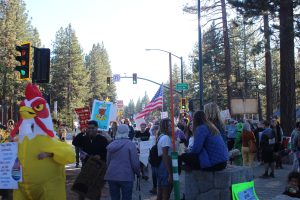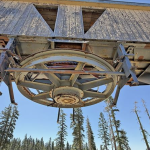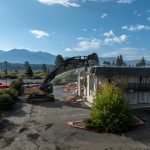Mayor and council appointment, VHR ordinance, Prop 50: city council updates
SOUTH LAKE TAHOE, Calif. – City council convened their first official meeting after the resignation of former mayor Tamara Wallace. The council made a decision on the empty seats that Wallace left, as well as the vacation home rental (VHR) ordinance that has been discussed since the overturning of Measure T.
Empty seats
Wallace formerly served on the California Tahoe Conservancy, City Selection Committee, the El Dorado Local Agency Formation Commission, El Dorado County Oversight Board, the Cal Tahoe Joint Powers Authority (JPA), Clean Tahoe and Park Avenue Development Project Plaza Maintenance Association (PADMA). The last two will have meetings before the typical appointment of members to these seats, which would happen in the December council meeting.
Cody Bass, who has been on PADMA, said that the president of the board told him that he would like David Jinkens to serve on PADMA. Scott Robbins nominated himself for Clean Tahoe, and Keith Roberts serves as the second seat from council on Clean Tahoe.
Both nominations passed unanimously.
The council also decided to solicit applications for an appointment. If they are unable to decide, they will call for a special election, which would take place on June 2nd. The new member would serve the remainder of Wallace’s term, which ends in 2026, along with Robbins and Bass’s terms.
Bass was appointed to Mayor, but no Mayor Pro Tem was selected. The council chose to delay an appointment of the position until they appointed someone new.
Many people were disappointed that Bass was chosen as mayor for different reasons. Given Bass’s previous legal troubles, several wondered why he was not held to the same standard as city employees or even other business owners in the community. Angie Reagan asked Bass during public comment, “Do you have a conscience? Then step down.”
However, supporters of Bass were also at the meeting, noting his advances for transportation, business and other issues during his time on the council. One first-time attendee said that Bass was a voice for the younger generation in the community.
The application period for a new city council member is open from October 24 to November 12 at 4 p.m. At the November 18 city council meeting, applicants will do 3-minute presentations to city council, which may be followed by questions from council. Once interviews are concluded, the council may pass a motion to appoint a member.
VHR ordinance
Another lengthy meeting came about with a first reading of the amendments to the VHR ordinance. There were two possible versions of the ordinance, though both contained the following amendments:
- A minimum age of 25 established to rent a VHR
- Attached condominiums may get VHR permits unless applicable homeowners association rules prohibit VHRs
- Require advertising platforms to include “family friendly” language for VHRs in residential areas
- Appeals for permit denials go to an independent hearing officer rather than the planning commission
- Commercial and recreational areas are regulated with rules applicable to the tourist core area plan
- Room night reporting is required
The difference between the two ordinances had to do with the 150-foot buffer. Version 1 replaces it with a cap of no more than 1,200 VHR permits in residential areas, while version 2 replaces it with a prohibition of properties with VHR permits being adjacent to each other.
Public comment lasted for over an hour, though primary concerns had to do with housing affordability and the feasibility of the ordinance. Several people brought up concerns about sex offenders or other criminals being present in neighborhoods because of VHRs in residential areas.
The already high tensions of the night escalated as Robbins and Jinkens discussed the ordinance. Robbins has notably been extremely opposed to the VHR ordinance given its impacts on housing affordability, the workforce and families, and he has many times spoken about his negative experiences with VHRs in his own neighborhood.
Robbins noted that while people in public comment offered jobs or Sugar Pine Village as options to families who are being displaced, it was inadequate to address the issue. The people he was concerned about are already working in the community and would not qualify for 80% or lower of the area median income for housing. Rather, their homes are treated as business opportunities for VHRs, which are often seen as more profitable than long-term renting to locals.
While he made a motion not to accept either version, the vote was split, causing the motion to fail.
Jinkens made a motion to approve version 2’s first reading, which was seconded by Roberts.
Bass made a point before the vote, “I want (these amendments) to go through a real process of real public workshops—come together, bring us more changes, there are a lot more that need to be done that need to be done then are presented to us tonight.”
However, the motion failed. Bass recommended that they move the item to a meeting when there is a fifth person appointed so they wouldn’t end up in split vote situations.
Proposition 50
In September, Roberts had requested a discussion item on the council’s opposition to Proposition 50, which was seconded by former Mayor Tamara Wallace.
Proposition 50 would redistrict District 3, which currently contains the counties of Plumas, Yuba, Sierra, Nevada, Placer, Alpine, Mono and Inyo along with a portion of El Dorado County. The proposed redistricting, which would maintain blue seats in response to Texas’ redistricting, the city of South Lake Tahoe would remain in District 3, but District 3 would be significantly modified to contain portions of Placer, El Dorado and Sacramento counties, as well as Nevada County.
Sue Chandler, chair of the South Lake Tahoe Democrats Club, said that she had taken part in the Board of Supervisors meeting in the morning, where they removed their Prop 50 resolution. She said they felt it was not appropriate because it was going to be on the ballot, where voters should decide.
“This resolution has absolutely nothing to do with the values and mission of the city of South Lake Tahoe… therefore, it’s not in the sandbox of the city council to even be considering this resolution,” said Chandler. She also noted that during a previous gubernatorial recall, the council didn’t make a stance at the time.
Almost every attendee during public comment agreed that it was not appropriate for the city council to weigh in on this particular issue, and that it would open up Pandora’s box. Some also noted that there were greater federal issues that were impacting the residents, such as the fate of public lands and healthcare. Several referenced the No Kings protest that took place last weekend.
David Gregorich also said that council was not being effective in handling city business, as the meeting had gone to nearly 11 p.m. at that point.
Two dissenting voices came from Carol Dawn and John Messina, who opposed gerrymandering and a change of local officials who were voted on.
Roberts said that he did not bring up the resolution as a partisan issue, which Jinkens agreed with. “I don’t have any problem voting no against this resolution just to keep face, but I do predict we will suffer to some degree as a city, and I thought it was my job as a councilman to protect this city,” said Roberts.
Robbins said, “We can have a discussion on whether or not Kevin Kiley has been good for our community, and I think that’s a hard case to make. He has voted to slash healthcare, to slash funding for the Forest Service, voted in support of terrorizing our LGBTQ+ and immigrant community.”
Robbins also agreed with Gregorich’s comment, saying that they had placed VHR ordinances and weighing into national politics over city objectives. “Prop 50 has nothing to do with what we were elected to do for the community.”
Bass stated that he felt Prop 50 had very little to do with the city.
The motion to drop the resolution passed, with a no vote from David Jinkens.
Councilmember reports
Robbins provided a report on the Cal Cities conference, including sessions on transit funding developments and eroded trust in city councils, “which was just a little too on the nose.” Robbins also noted a session on childcare as critical infrastructure, which he felt was the most interesting one to consider for the city.
Jinkens noted again that he was interested in a legislative strategy discussing state issues within the city. He also said he was sad that Italian Americans were not able to get a proclamation recognizing them.
The next city council meeting will take place on November 4.
Eli Ramos is a reporter for Tahoe Daily Tribune. They are part of the 2024–26 cohort of California Local News Fellows through UC Berkeley.

Support Local Journalism

Support Local Journalism
Readers around the Lake Tahoe Basin and beyond make the Tahoe Tribune's work possible. Your financial contribution supports our efforts to deliver quality, locally relevant journalism.
Now more than ever, your support is critical to help us keep our community informed about the evolving coronavirus pandemic and the impact it is having locally. Every contribution, however large or small, will make a difference.
Your donation will help us continue to cover COVID-19 and our other vital local news.











